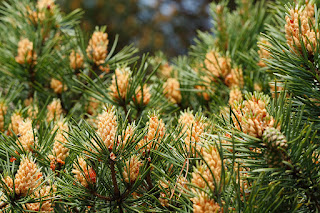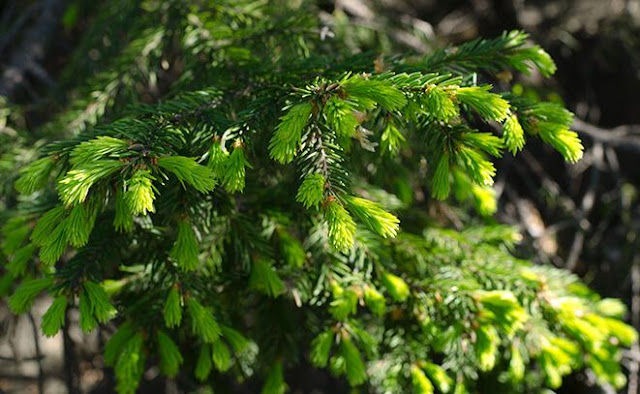The Healing Power of Pine Pollen
Pollen regulates human life processes. This has long been
noticed by people involved in traditional medicine. Doctors do not stand aside,
who began to pay much attention to pine pollen. Because pine pollen is a
powerful superfood and for the body loaded with 100s of Vitamins and minerals.
Vitamin B6 in pine pollen plays a protective role against pancreatic cells,
therefore it will be very useful for diabetics, cardiovascular diseases,
all lung diseases, people with weakened immune systems, cancer patients. More
about the benefits of pollen and what diseases pine pollen powder and tincture can help.
Composition of
coniferous pollen
Before talking about the beneficial properties of pine
pollen, you need to understand its composition. This natural product contains a
large number of fats, proteins, and lipids. Of the amino acids in the pollen,
glycine, glutamic acid and threonine are present.
Pine pollen is a unique source of vitamins B1, B2, B6, B12,
C, A. It contains a large number of flavonoids - plant components that regulate
many internal systems of human organs.
Also in the pollen of coniferous trees, there are the
following substances necessary for human health:
·
Macronutrients - phosphorus, magnesium,
potassium, calcium;
·
Trace elements - zinc, selenium, copper, iron.
This combination of components makes pine pollen a healing product that is used to treat severe pathologies.
Beneficial features
Herbalists dispel the misconception that pine pollen can be
an allergen. Despite the fact that pollinosis is present in a high
concentration in pine, coniferous pollen does not provoke allergic reactions.
This is explained by its chemical composition and the fact that the grains of
conifers are quite small, in contrast to alder and birch. With such grain
sizes, pollen is completely microscopic and does not enter the bronchi, but
lingers on the mucous membranes of the upper respiratory tract.
Initially, this remedy was discovered by the healers of
Korea and China. Inhabitants of Asia took pollen as a food supplement to
increase tone, relieve fatigue, improve male potency, strengthen immunity, and longevity.
The popularity of this natural product came to Russia after
the publication in 1978 of the book Forest Medicinal Plants. Its author A.P.
Popov described in detail the biological properties of medicinal plants and
their use in folk medicine. It was thanks to his research work and recipes for
preparing infusions of pine pollen that the possibility of treating chronic
diseases at home became available.
Let's look at together in more detail the beneficial
properties of pine pollen tincture.
Pine pollen is a natural antibiotic effective against Koch
bacillus, the causative agent of pulmonary tuberculosis. After taking decoctions
based on pollen, the reproduction of mycobacteria slows down and their gradual
death occurs.
Cardiovascular
protection
Antioxidants, pine pollen flavonoids remove toxins and
toxins from the body, which, in turn, reduces the level of bad cholesterol and
lipids in the blood. Due to this action, the tool becomes a good prevention of
stroke, atherosclerosis, and the growth of cholesterol plaques in the vessels.
With regular intake of pollen supplements or infusions, blood circulation,
capillary permeability and elasticity, oxygen supply to the brain and neurons
improve.
Normalization of the
intestines
During clinical trials, it was found that the cause of
indigestion is often stress, constant emotional decline. The composition of
pine pollen contains magnesium and calcium, which help relieve nervous tension,
as a result of which the work of the digestive tract is normalized.
Coniferous pollen accelerates the digestion of food, the
absorption of nutrients improves intestinal motility, and normalizes appetite.
Given these properties of the product, it is recommended to use it to treat
diarrhea. Patients suffering from constipation respond particularly well to
pollen. This is explained by the fact that vitamin B6, which is part of the
composition, relaxes muscles during a spasm.
Antitumor effect
When diagnosing tumor-like malignant neoplasms, physiotherapists
recommend using pine pollen as a means of inhibiting the growth of cancer
cells. This natural product acts on the lesions stimulates the immune system
and does not harm the general health, unlike other aggressive treatment
methods.
The uniqueness of pollen is that it only affects the tumor
and does not affect healthy cells. Its use is recommended during remission, to
restore the body after radiation and chemotherapy. Regular intake of pine
pollen as a dietary supplement helps prevent the growth of benign neoplasms and
leads to their gradual resumption.
The secret of
longevity
Recent studies have found that coniferous grains with pollen
have chemical elements that slow down aging. We are talking about natural
antioxidants, vitamins and mineral complexes that prevent oxidation processes
in the body. With regular intake of pine pollen, the tone and elasticity of the
skin are preserved, wrinkles are less likely, and hair does not fall out. In
addition, there is a restoration of all body functions, and the vital potential
does not decrease.
Gentle liver
cleansing
In chronic liver pathologies, the process of natural renewal
of organ cells is disrupted. Pine pollen constituents such as amino acids,
proteins, and enzymes have hepatoprotective properties. This means that when
using homemade decoctions based on this coniferous product, toxins are removed
from the liver and its damaged tissues are regenerated.
For men's health
The benefit of pine pollen is that it stimulates the restoration
of tumors in the prostate, relieves bouts of pain, and reduces inflammation.
Pollen-based medicines improve blood circulation in the pelvic organs in men.
As a result of the elimination of stagnant processes, the functioning of the urinary system is restored and the former potency is returned. Read More: pine pollen for women


Comments
Post a Comment